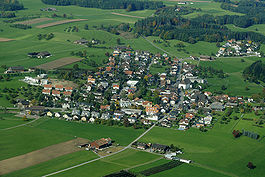Niederhelfenschwil
| Niederhelfenschwil | ||
|---|---|---|

Niederhelfenschwil village from the air
|
||
|
||
| Coordinates: 47°29′N 9°11′E / 47.483°N 9.183°ECoordinates: 47°29′N 9°11′E / 47.483°N 9.183°E | ||
| Country | Switzerland | |
| Canton | St. Gallen | |
| District | Wil | |
| Government | ||
| • Mayor | Simon Thalmann | |
| Area | ||
| • Total | 16.33 km2 (6.31 sq mi) | |
| Elevation | 580 m (1,900 ft) | |
| Population (Dec 2015) | ||
| • Total | 3,008 | |
| • Density | 180/km2 (480/sq mi) | |
| Postal code | 9527 | |
| SFOS number | 3423 | |
| Surrounded by | Bischofszell (TG), Kradolf-Schönenberg (TG), Niederbüren, Oberbüren, Wuppenau (TG), Zuzwil | |
| Website |
www SFSO statistics |
|
Niederhelfenschwil is a municipality in the Wahlkreis (constituency) of Wil in the canton of St. Gallen in Switzerland.
Niederhelfenschwil is first mentioned in 818 as Helfolteswilare. In 1426 it was mentioned as Nidren-Helffentswile. The village of Lenggenwil was mentioned in 903 as Linkenvilare.
Niederhelfenschwil has an area, as of 2006[update], of 16.3 km2 (6.3 sq mi). Of this area, 71.1% is used for agricultural purposes, while 19.8% is forested. Of the rest of the land, 8.4% is settled (buildings or roads) and the remainder (0.6%) is non-productive (rivers or lakes).
The municipality is located in the Wil Wahlkreis, north of the Thur river between Bischofszell and Wil. It consists of the villages of Niederhelfenschwil, Lenggenwil and Schloss Zuckenriet as well as the hamlets of Enkhüseren, Dietenwil and Dägetschwil.
The blazon of the municipal coat of arms is Azure between a Pall Or letters N, L and Z
Niederhelfenschwil has a population (as of 31 December 2015) of 3,008. As of 2007[update], about 5.6% of the population was made up of foreign nationals. Of the foreign population, (as of 2000[update]), 34 are from Germany, 16 are from Italy, 50 are from ex-Yugoslavia, 9 are from Austria, 5 are from Turkey, and 44 are from another country. Over the last 10 years the population has grown at a rate of 11.6%. Most of the population (as of 2000[update]) speaks German (97.0%), with Albanian being second most common ( 1.0%) and Portuguese being third ( 0.4%). Of the Swiss national languages (as of 2000[update]), 2,522 speak German, 2 people speak French, 8 people speak Italian, and 1 person speaks Romansh.
...
Wikipedia



